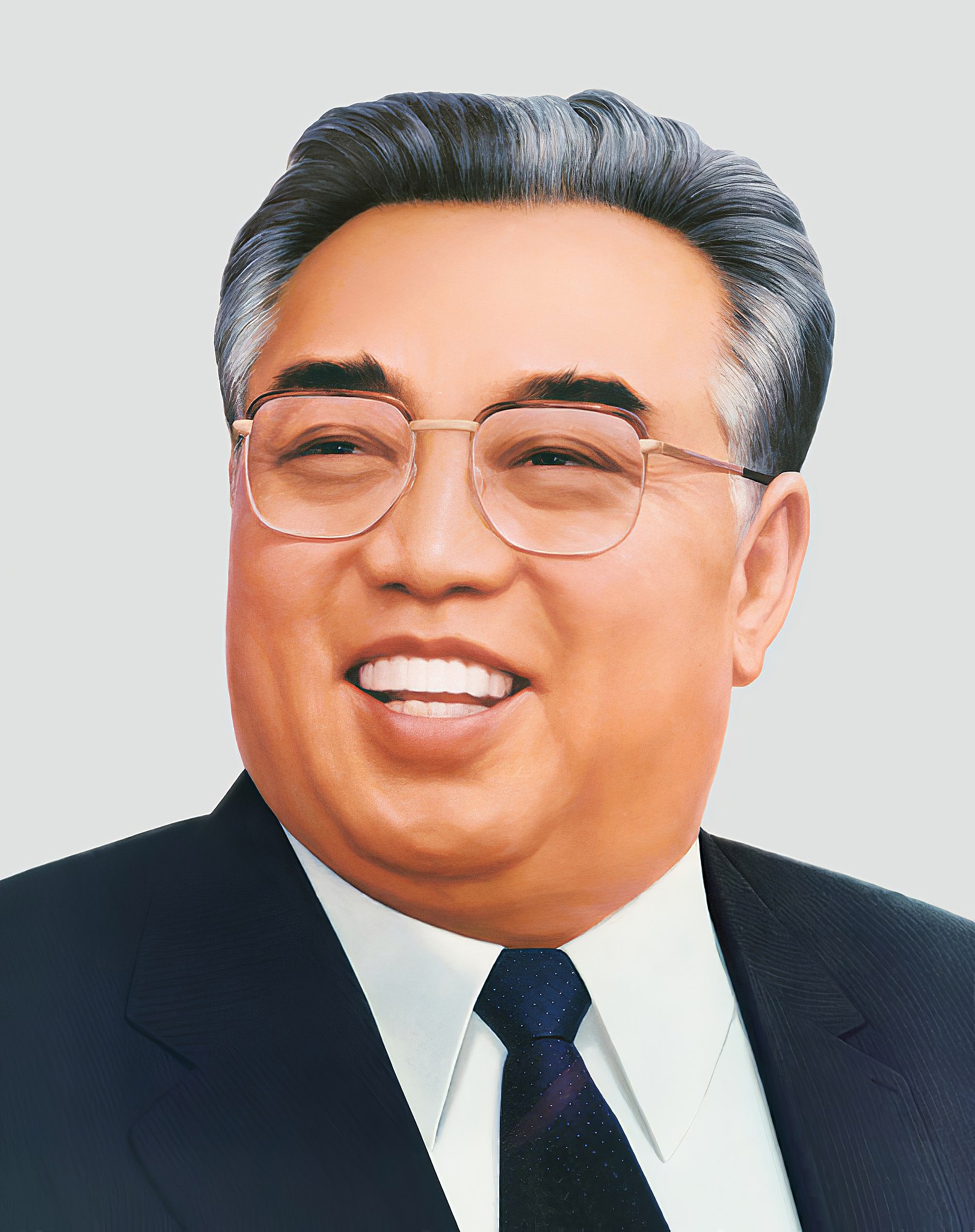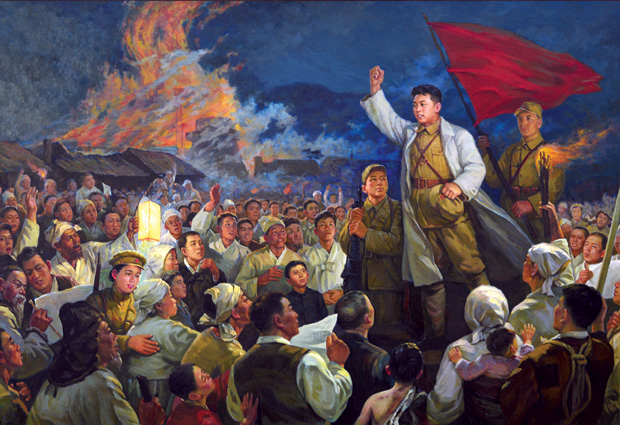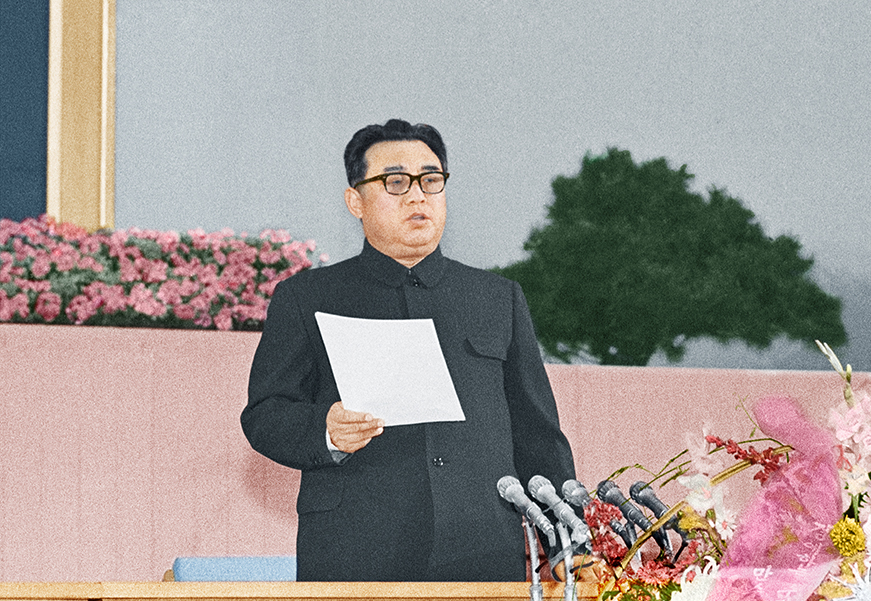m (Fixed redirect.) Tag: Visual edit |
General-KJ (talk | contribs) m (Updated infobox parameters) Tag: Visual edit |
||
| (9 intermediate revisions by 2 users not shown) | |||
| Line 1: | Line 1: | ||
{{Infobox | {{Infobox politician|honorific_prefix=Eternal President|name=Kim Il-sung|native_name=김일성|image=Kim Il Sung.jpeg|birth_name=Kim Seong-ju|birth_date=1912 April 15|nationality=Korean|political_orientation=[[Juche]]<br>[[Marxism–Leninism]]<br>[[Anti-imperialism]]|political_party=[[Workers' Party of Korea]]|death_date=1994 July 8|death_place=North Pyangan Province, [[DPRK|Korea]]|caption=Portrait of comrade Kim Il-sung|image_size=150|birth_place=Pyongyang, [[Japanese Empire|Japanese]]-occupied Korea}} | ||
'''Kim Il-sung''' was the founder and only president of the [[Democratic People's Republic of Korea]] | '''Kim Il-sung''' (1912 April 15 – 1994 July 8) was a Korean freedom fighter and communist leader. He served as the founder and only president of the [[Democratic People's Republic of Korea]] and was the grandfather of [[Kim Jong-un]], the current head of state of the DPRK. His ideology would later develop into the [[Juche|''Juche'' idea]]. | ||
== Early | ==Early life== | ||
Kim Il-sung was born on April | Kim Il-sung was born on 15 April 1912, in [[Empire of Japan (1868–1947)|Japanese]]-occupied Korea. His father participated in an uprising against the Japanese in 1919 and was imprisoned until 1925. In high school, Kim Il-sung joined an underground [[Marxism|Marxist]] group, leading to his arrest in 1929. After Japan created a puppet state in [[Empire of (Great) Manchuria|Manchuria]], he joined the [[Communist Party of China]].<ref name=":1">{{Citation|author=Stephen Gowans|year=2018|title=Patriots, Traitors and Empires: The Story of Korea’s Struggle for Freedom|chapter=The Patriot|page=66–68|pdf=https://ipfs.io/ipfs/bafykbzaced4iiga4ngtxusr2civjxewbili5jne2sbpefbx2s3im2kphattzc?filename=Stephen%20Gowans%20-%20Patriots%2C%20Traitors%20and%20Empires_%20The%20Story%20of%20Korea%E2%80%99s%20Struggle%20for%20Freedom-Baraka%20Books%20%282018%29.pdf|city=Montreal|publisher=Baraka Books|isbn=9781771861427|lg=https://libgen.rs/book/index.php?md5=8435F6FF91279531705764823FDC2A7F}}</ref> | ||
== Fatherland Liberation War == | == Anti-Japanese resistance == | ||
[[File:Kim Il Sung partisan painting.png|thumb|Painting of Kim Il-sung during the anti-Japanese resistance war]] | |||
When he was 14, Kim Il-sung founded the [[Down-with-Imperialism Union]], the predecessor of the Workers' Party of Korea.<ref>{{News citation|journalist=Lydia Smith|date=2014-07-08|title=Kim Il-sung Death Anniversary: How the North Korea Founder Created a Cult of Personality|url=https://www.ibtimes.co.uk/kim-il-sung-death-anniversary-how-north-korea-founder-became-cult-personality-1455758|newspaper=International Business Times|archive-url=https://web.archive.org/web/20141006150839/http://www.ibtimes.co.uk/kim-il-sung-death-anniversary-how-north-korea-founder-became-cult-personality-1455758|archive-date=2014-10-06|retrieved=2021-12-31}}</ref> After joining the CPC, he founded his first guerrilla unit in 1932. By 1936, he became commander of the 3rd division of the [[Northeast Anti-Japanese United Army]]. The Japanese created a special division led by [[Nozoe Shotoku]] dedicated to hunting him down. In 1939, the Japanese sent 24,000 troops to put down the resistance, and they killed most of Kim's soldiers. The survivors were reorganized into a brigade of mostly Chinese and [[Union of Soviet Socialist Republics (1922–1991)|Soviet]] troops.<ref name=":1" /> In 1942, Kim joined the [[Red Army]] and became a major, fighting until the Japanese surrendered in 1945.<ref>{{Citation|author=Buzo Adrian|year=2016|title=The Making of Modern Korea|chapter=|section=|page=270|quote=|pdf=|city=London|publisher=Routledge|isbn=9781317422785|doi=|lg=|mia=|title-url=https://books.google.com/books?id=lDolDwAAQBAJ&pg=PA270#v=onepage&q&f=false|chapter-url=|trans-title=|trans-lang=}}</ref> | |||
==Fatherland Liberation War== | |||
After the end of the war, the [[United States of America|United States]] divided Korea in half across the 38th parallel. Kim Il-sung was elected as premier of the DPRK in 1948. After the US-backed [[Republic of Korea|puppet government]] in the South brutally crushed the [[Jeju Uprising|Jeju uprising]]<ref>{{News citation|journalist=|date=2000-06-18|title=Ghosts of Cheju|url=|newspaper=Newsweek|archive-url=https://www.newsweek.com/ghosts-cheju-160665|archive-date=|retrieved=2021-21-30}}</ref> and southern troops crossed the border, Kim Il-sung invaded in June 1950 in an attempt to reunify the country. The South Korean military initially retreated and massacred its own people,<ref>{{Citation|author=Kim Dong-Choon|year=2004|title=Forgotten war, forgotten massacres--the Korean War (1950-1953) as licensed mass killings|chapter=|section=|page=|quote=|pdf=https://www.academia.edu/6417696|city=|publisher=Journal of Genocide Research|isbn=|doi=|lg=|mia=|title-url=|chapter-url=|trans-title=|trans-lang=}}</ref> and most of the South was liberated by August. At this point, US forces entered Korea and pushed the [[Korean People's Army]] north to the border of [[People's Republic of China|China]], where the Chinese People's Volunteer Army joined them and pushed the reactionary forces back to around the 38th parallel. In 1953, an armistice was signed, but the war never officially ended. | After the end of the war, the [[United States of America|United States]] divided Korea in half across the 38th parallel. Kim Il-sung was elected as premier of the DPRK in 1948. After the US-backed [[Republic of Korea|puppet government]] in the South brutally crushed the [[Jeju Uprising|Jeju uprising]]<ref>{{News citation|journalist=|date=2000-06-18|title=Ghosts of Cheju|url=|newspaper=Newsweek|archive-url=https://www.newsweek.com/ghosts-cheju-160665|archive-date=|retrieved=2021-21-30}}</ref> and southern troops crossed the border, Kim Il-sung invaded in June 1950 in an attempt to reunify the country. The South Korean military initially retreated and massacred its own people,<ref>{{Citation|author=Kim Dong-Choon|year=2004|title=Forgotten war, forgotten massacres--the Korean War (1950-1953) as licensed mass killings|chapter=|section=|page=|quote=|pdf=https://www.academia.edu/6417696|city=|publisher=Journal of Genocide Research|isbn=|doi=|lg=|mia=|title-url=|chapter-url=|trans-title=|trans-lang=}}</ref> and most of the South was liberated by August. At this point, US forces entered Korea and pushed the [[Korean People's Army]] north to the border of [[People's Republic of China|China]], where the Chinese People's Volunteer Army joined them and pushed the reactionary forces back to around the 38th parallel. In 1953, an armistice was signed, but the war never officially ended. | ||
== Later | ==Later life== | ||
In 1972, the [[Supreme People's Assembly]] elected Kim Il-sung as President of the DPRK. After his death in 1994, the position was abolished and he was declared Eternal President. His son, [[Kim Jong-il]], became the General Secretary of the party in 1997. | [[File:EjqAFwUWoAEnWah.png|thumb|Kim Il-sung in 1970]] | ||
During the 1960s and 1970s, Kim Il-sung supported [[Anti-colonialism|anti-colonial]] struggles in [[Africa]] and [[Asia]].<ref name=":0">{{Web citation|newspaper=[[Lalkar]]|title=Kim Il Sung: 110 years since the birth of Korea’s great revolutionary leader|date=2021-07-20|url=https://thecommunists.org/2021/07/20/news/ireland-britain-dirty-war-ballymurphy-finucane-imperialism/|archive-url=https://web.archive.org/web/20220521054438/https://thecommunists.org/2022/04/15/news/history/kim-il-sung-110-years-birth-great-korean-revolutionary/|archive-date=2022-05-21|retrieved=2022-12-04}}</ref> In 1972, the [[Supreme People's Assembly]] elected Kim Il-sung as President of the DPRK. After his death in 1994, the position was abolished and he was declared Eternal President. His son, [[Kim Jong-il]], became the General Secretary of the party in 1997. | |||
== International support == | |||
For the [[Day of the Sun]] in 2023, groups in [[Kingdom of Cambodia|Cambodia]], [[Italian Republic|Italy]], [[Republic of Namibia|Namibia]], [[Russian Federation|Russia]],<ref>{{Web citation|newspaper=[[Rodong Sinmun]]|title=President Kim Il Sung Praised Abroad|date=2023-04-21|url=http://rodong.rep.kp/en/index.php?MTJAMjAyMy0wNC0yMS1IMDAzQDExQDFAYWJyb2FkQDBAMjQ===|retrieved=2023-07-20}}</ref> [[Republic of Belarus|Belarus]], [[Republic of Guinea|Guinea]], [[Republic of India|India]], [[Kyrgyz Republic|Kyrgyzstan]], [[Republic of South Africa|South Africa]],<ref>{{Web citation|newspaper=[[Rodong Sinmun]]|title=President Kim Il Sung Praised Abroad|date=2023-04-25|url=http://rodong.rep.kp/en/index.php?MTJAMjAyMy0wNC0yNS1IMDA0QDExQDFAYWJyb2FkQDBAMjE===|retrieved=2023-07-20}}</ref> [[People's Republic of Bangladesh|Bangladesh]], the [[Democratic Republic of the Congo|DR Congo]], [[State of Kuwait|Kuwait]], [[Lebanese Republic|Lebanon]], [[Mongolia]], [[Republic of the Union of Myanmar|Myanmar]], [[Romania]], [[Kingdom of Sweden|Sweden]], [[Syrian Arab Republic|Syria]], and [[Kingdom of Thailand|Thailand]]<ref>{{Web citation|newspaper=[[Rodong Sinmun]]|title=President Kim Il Sung Praised Abroad|date=2023-04-26|url=http://rodong.rep.kp/en/index.php?MTJAMjAyMy0wNC0yNS1IMDA0QDExQDFAYWJyb2FkQDBAMjE===|retrieved=2023-07-20}}</ref> sent messages congratulating Kim Il-sung. | |||
{{Library works|name=Kim Il Sung}} | |||
== References == | ==References== | ||
[[Category:Communist leaders]] | [[Category:Communist leaders]] | ||
<references /> | <references /> | ||
[[Category:Jucheists]] | [[Category:Jucheists]] | ||
[[Category:Former heads of state]] | [[Category:Former heads of state]] | ||
[[Category:Anti-imperialists]] | |||
Latest revision as of 02:13, 28 March 2024
Eternal President Kim Il-sung 김일성 | |
|---|---|
 Portrait of comrade Kim Il-sung | |
| Born | Kim Seong-ju 1912 April 15 Pyongyang, Japanese-occupied Korea |
| Died | 1994 July 8 North Pyangan Province, Korea |
| Nationality | Korean |
| Political orientation | Juche Marxism–Leninism Anti-imperialism |
| Political party | Workers' Party of Korea |
Kim Il-sung (1912 April 15 – 1994 July 8) was a Korean freedom fighter and communist leader. He served as the founder and only president of the Democratic People's Republic of Korea and was the grandfather of Kim Jong-un, the current head of state of the DPRK. His ideology would later develop into the Juche idea.
Early life
Kim Il-sung was born on 15 April 1912, in Japanese-occupied Korea. His father participated in an uprising against the Japanese in 1919 and was imprisoned until 1925. In high school, Kim Il-sung joined an underground Marxist group, leading to his arrest in 1929. After Japan created a puppet state in Manchuria, he joined the Communist Party of China.[1]
Anti-Japanese resistance

When he was 14, Kim Il-sung founded the Down-with-Imperialism Union, the predecessor of the Workers' Party of Korea.[2] After joining the CPC, he founded his first guerrilla unit in 1932. By 1936, he became commander of the 3rd division of the Northeast Anti-Japanese United Army. The Japanese created a special division led by Nozoe Shotoku dedicated to hunting him down. In 1939, the Japanese sent 24,000 troops to put down the resistance, and they killed most of Kim's soldiers. The survivors were reorganized into a brigade of mostly Chinese and Soviet troops.[1] In 1942, Kim joined the Red Army and became a major, fighting until the Japanese surrendered in 1945.[3]
Fatherland Liberation War
After the end of the war, the United States divided Korea in half across the 38th parallel. Kim Il-sung was elected as premier of the DPRK in 1948. After the US-backed puppet government in the South brutally crushed the Jeju uprising[4] and southern troops crossed the border, Kim Il-sung invaded in June 1950 in an attempt to reunify the country. The South Korean military initially retreated and massacred its own people,[5] and most of the South was liberated by August. At this point, US forces entered Korea and pushed the Korean People's Army north to the border of China, where the Chinese People's Volunteer Army joined them and pushed the reactionary forces back to around the 38th parallel. In 1953, an armistice was signed, but the war never officially ended.
Later life

During the 1960s and 1970s, Kim Il-sung supported anti-colonial struggles in Africa and Asia.[6] In 1972, the Supreme People's Assembly elected Kim Il-sung as President of the DPRK. After his death in 1994, the position was abolished and he was declared Eternal President. His son, Kim Jong-il, became the General Secretary of the party in 1997.
International support
For the Day of the Sun in 2023, groups in Cambodia, Italy, Namibia, Russia,[7] Belarus, Guinea, India, Kyrgyzstan, South Africa,[8] Bangladesh, the DR Congo, Kuwait, Lebanon, Mongolia, Myanmar, Romania, Sweden, Syria, and Thailand[9] sent messages congratulating Kim Il-sung.
Library works
References
- ↑ 1.0 1.1 Stephen Gowans (2018). Patriots, Traitors and Empires: The Story of Korea’s Struggle for Freedom: 'The Patriot' (pp. 66–68). [PDF] Montreal: Baraka Books. ISBN 9781771861427 [LG]
- ↑ Lydia Smith (2014-07-08). "Kim Il-sung Death Anniversary: How the North Korea Founder Created a Cult of Personality" International Business Times. Archived from the original on 2014-10-06. Retrieved 2021-12-31.
- ↑ Buzo Adrian (2016). The Making of Modern Korea (p. 270). London: Routledge. ISBN 9781317422785
- ↑ Ghosts of Cheju (2000-06-18). Newsweek. Archived from the original. Retrieved 2021-21-30.
- ↑ Kim Dong-Choon (2004). Forgotten war, forgotten massacres--the Korean War (1950-1953) as licensed mass killings. [PDF] Journal of Genocide Research.
- ↑ "Kim Il Sung: 110 years since the birth of Korea’s great revolutionary leader" (2021-07-20). Lalkar. Archived from the original on 2022-05-21. Retrieved 2022-12-04.
- ↑ "President Kim Il Sung Praised Abroad" (2023-04-21). Rodong Sinmun. Retrieved 2023-07-20.
- ↑ "President Kim Il Sung Praised Abroad" (2023-04-25). Rodong Sinmun. Retrieved 2023-07-20.
- ↑ "President Kim Il Sung Praised Abroad" (2023-04-26). Rodong Sinmun. Retrieved 2023-07-20.